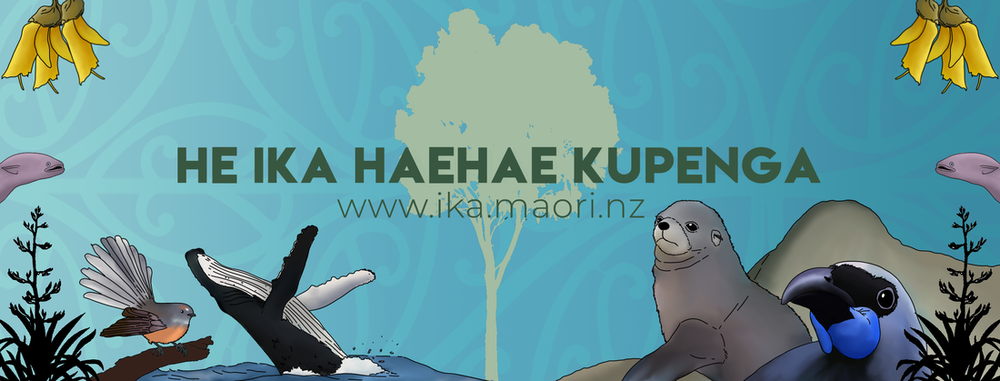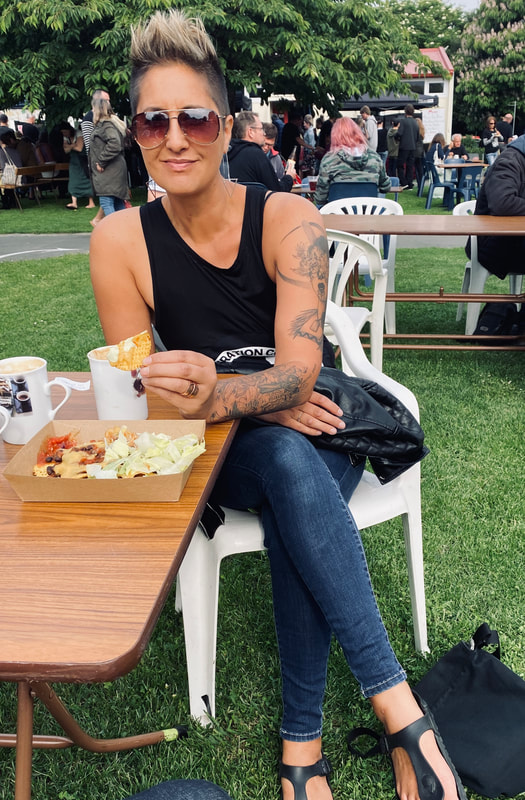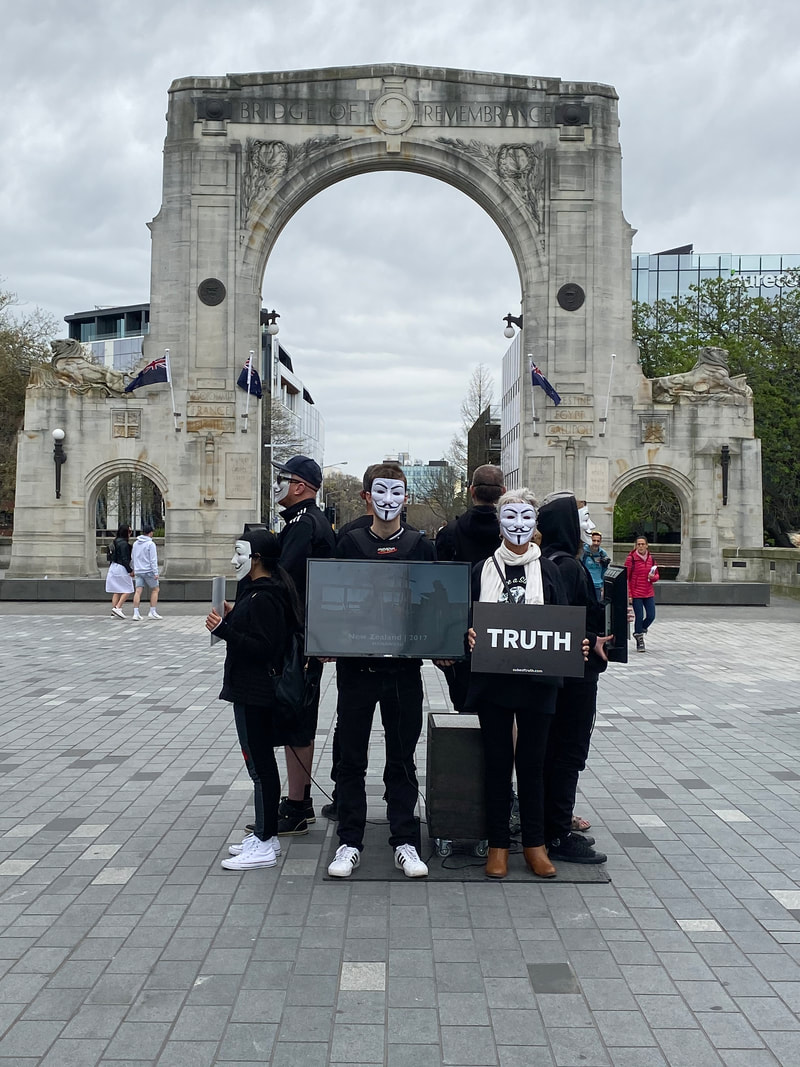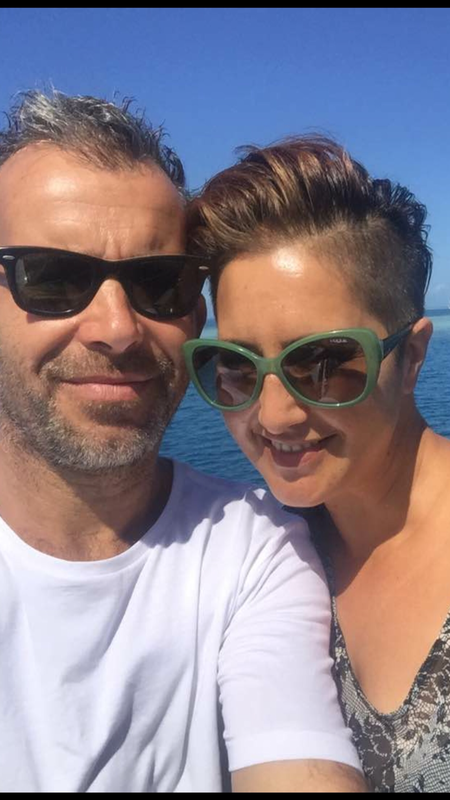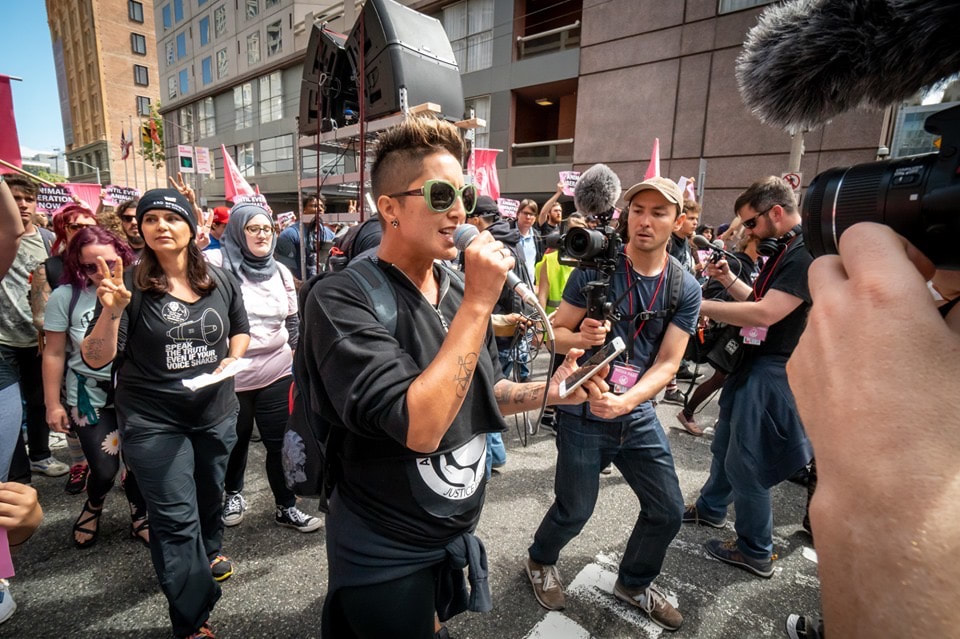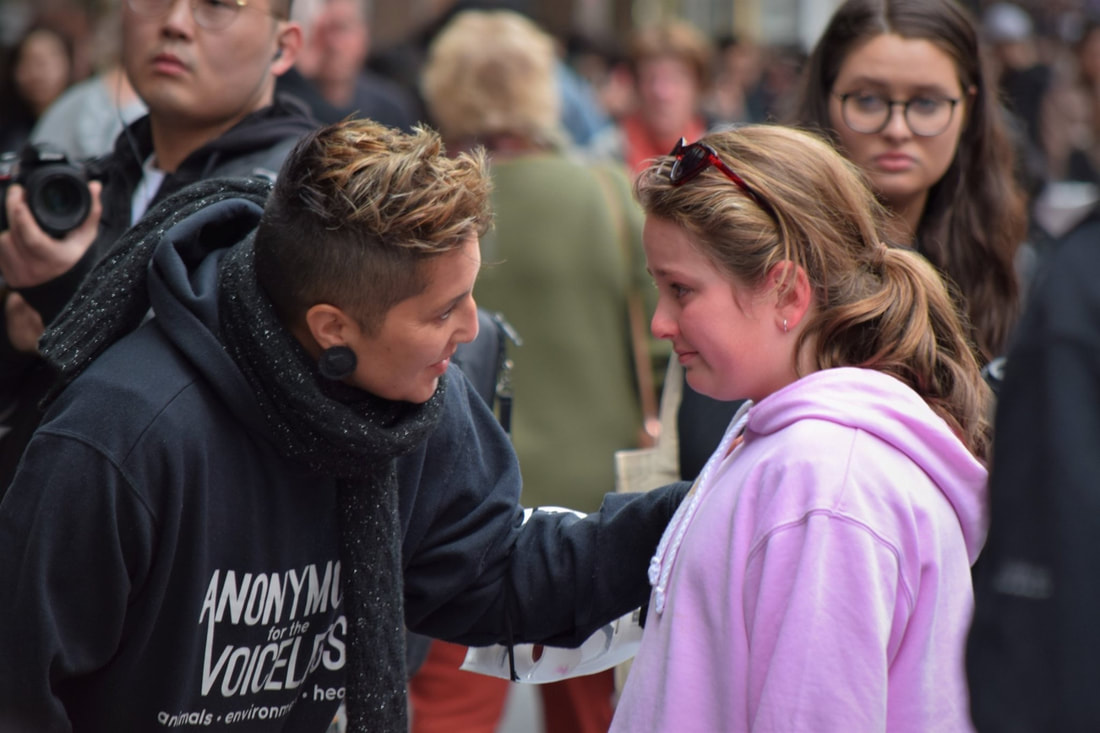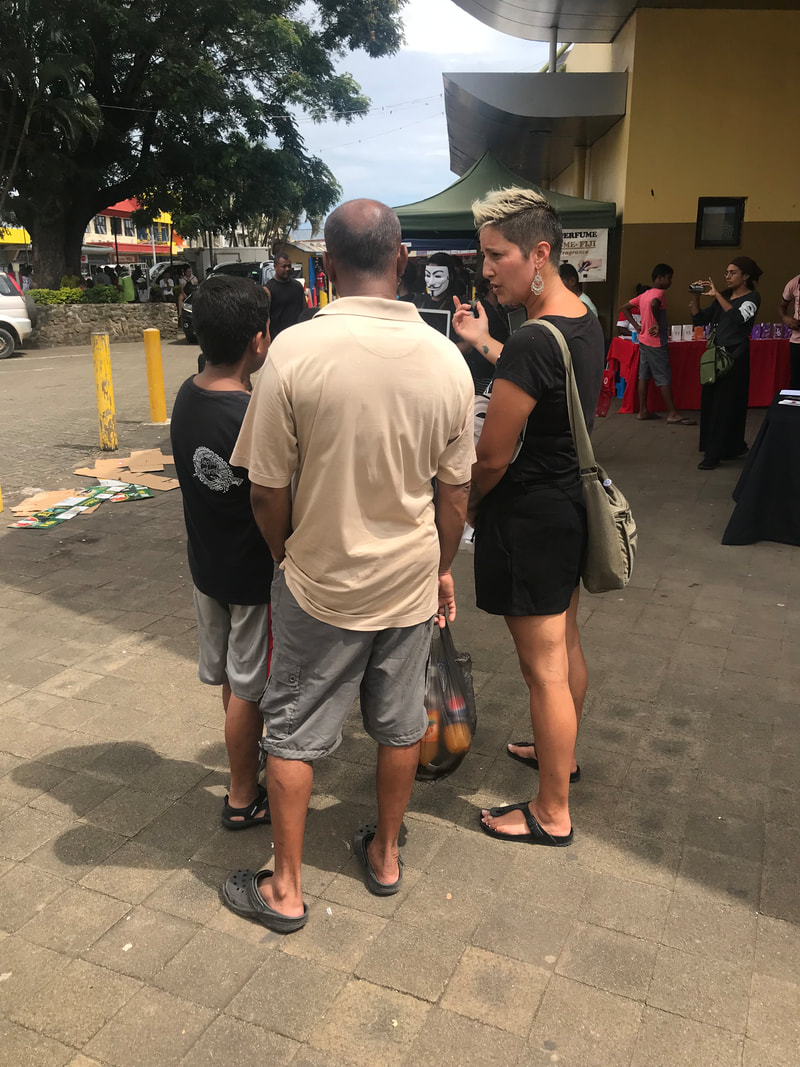Dom Mallard
interview with Philip McKibbin
Dom Mallard (Waikato, Ngāti Hine, Ngāpuhi, Ngāti Apakura) is an animal rights activist and musician. She works for Anonymous for the Voiceless, an international animal rights organisation. She lives in Ōtautahi with her husband Kelvin, their canine companion Eva, and Ringo, their feline boss.
Tell me about your work for Anonymous for the Voiceless.
|
I maintain a few roles with Anonymous for the Voiceless (AV). On a voluntary basis, I am a co-organiser for the Christchurch AV chapter, and I am the Regional Organiser (RO) for New Zealand (I oversee and support organisers of the nine chapters that are currently active in Aotearoa). I am also employed full-time as the Regional Organiser Manager for the organisation. This has me heading a team of 26, where again I oversee and support the Regional Organisers in their roles covering regions throughout Europe, the Americas, Asia, Africa, Middle East and Oceania. I have volunteered with AV for two-and-a-half years (the organisation is three-and-a-half years old) and have been the RO Manager for five months.
Anonymous for the Voiceless is a not-for-profit animal rights organisation that specialises in using conversation and high-quality footage to educate the public about animal exploitation. We call this The Cube of Truth. With an abolitionist stance against all forms of animal exploitation, we hold Cube of Truth demonstrations all around the world with the aim of empowering the public to live vegan and speak up for animals. We currently have over 900 chapters worldwide and thousands of incredible vegan activists. AV is a voice against history’s largest and longest-standing injustice.
|
You're an abolitionist. What does that mean, and what are the implications for how you live your life?
|
Abolitionism is the animal rights-based opposition to all animal use by humans. Abolitionists maintain that all sentient beings share a basic right: the right not to be treated as the property of others. Abolitionists don’t adhere to the notion of taking incremental or welfare steps towards change – for example, incremental or welfare steps such as cage-free eggs, as opposed to stopping egg consumption completely by no longer using hens’ bodies.
I guess the implications are that I believe it is abolitionism that is going to achieve our goals of liberation for this planet. It is that assertion that propels me forward and makes me stay the course. Choosing to break free from the habits that we develop over the years can be difficult at times, probably because humans have a way of ‘okay-ing’ certain behaviours and what we deem to be ‘personal’ choices. Being an ethical vegan and an abolitionist is recognising that the only way to be truly fair to my fellow earthlings is to simply not make excuses for my behaviours. I figure I know better, so I should do better.
|
You went vegetarian when you were 13. What led to that decision?
So, essentially, once I learnt that I was eating the very things that I cherished, I simply stopped. I remember saying to Mum, ‘I’m not eating meat now.’ She said, ‘Like a vegetarian? So what am I supposed to feed you?’ Haha, she was less than impressed!
At that age, I knew nothing of what animals experienced in death; the notion had never actually occurred to me. I didn’t know any other vegetarians. The Internet was at least two decades away, so I hadn’t been exposed to images or information. I just didn’t like the thought that an animal who had once experienced life could now be served up to me as food. It seemed really weird and kinda gross.
Dad worked in a slaughterhouse. Although I don’t recall so much from my childhood, which was a very unsettled one due to domestic violence, I believe that he brought the violence of his work back into our whare. I do have vivid memories of him walking through the door at the end of a day of work, his white coveralls smeared red; his gumboots, various shades of white and pink, standing neatly at the back door. The knife set would usually be unwrapped and laid out on the bench with the sharpening stone, and he would set to work, readying his tools for the next day. Dad wasn’t a drinking man and he kept his ‘nose clean’, but he was often angry, and I can’t help but think that he felt a certain amount of shame.
As a kid, I never knew what he did for a living, but he, like every other dad (and some mums) in our town, worked at ‘The Works’. It wasn’t until many years later that I actually learnt of the horror he walked into and participated in, every day.
And now your whānau is vegan – ka rawe! How did that happen?
|
Yes! Five years ago, thanks to social media exposure on the realities of the dairy, egg, and clothing industries, and following it up with some research (that completely blew our minds!), we all turned vegan. My mum went vegan two years later!
I can’t believe I had never questioned these products before!
My husband had been raised a vegetarian for health, but we raised our four tamariki as vegetarians with a strong focus on showing kindness and compassion towards the vulnerable. I had always held a curiosity for activism, and as a teenager I started volunteering for groups like Greenpeace and NZAVS. A few years later, when my youngest was about a year old, I started attending the meetings of a local grass roots activist group. Many of those members were vegan. I had no idea about how to become a vegan, but I felt that it was something that perhaps I would one day be. I found those people very inspiring!
At the time I viewed veganism as being a bit ‘extreme’, and there was no way I would be able to do it raising kids, because I probably wouldn’t have much energy! Haha, isn’t it funny how we develop these notions when we lack the knowledge?
|
How do other Māori relate to your veganism?
That’s an interesting question. Well, my experiences have been on the whole, positive. I have had some pretty awesome conversations with Māori during my outreach at the Cube of Truth. Not just kai-focused, either. Almost on another level, a deeper understanding from a spiritual perspective, that connection to Papatūānuku and to all that share her. Discussions around kaimoana can be a little more challenging – culture becomes a bit of a sticking point here – but overall, as long as the person isn’t reliant on animals to make a living (don’t forget I'm in dairy country, Canterbury, so you don’t have to look far to find someone who is in that industry), he pai te kōrerorero. Especially speaking to wāhine and mums, explaining that there is so much more information out there now on how to nourish our tamariki with what comes from the soil, and how I wish I would’ve known back when my kids were young, the things that I do now. As women, we relate; as Māori women we connect; and as mums, we empathise with one another. We talk about the financial strains of feeding our whānau, keeping everyone sustained and interested in kai, and the empathy towards animals that is so often apparent in our tamariki.
I also have whānau that are intrigued by our choices. Like most vegans, I often struggle to have the conversation with whānau members for fear of sounding preachy or ‘judgey’. We tend to get more emotionally invested in these conversations, and they don’t always end up great. Again, social media has been helpful here. I have had three whānau members all reach out to me saying that they have been impacted by my Facebook posts, and have chosen to become ethical vegans. My dad is as stubborn as he ever was, but he supports and respects our decisions to be vegan. Whenever he comes to stay, he brings soy milk and vegan sausages, so I take that as a win! Haha!
What are some of the challenges involved with your animal rights work?
The human aspect is probably the most challenging. At both an activist level – e.g. on the streets, speaking with people who refuse to accept the truth – and working with people within the movement who at times lose sight of the goal. It’s all normal human stuff, and activists are no different to anyone else, but there are times when I find myself getting frustrated by the distractions of everyday life and human wants. I also feel challenged by the lack of ‘push’ in some parts of the vegan movement such as the big organisations who encourage incrementalism, choosing to side step the vegan message through fear of losing public or monetary support.
As well as campaigning for animal rights, you're a musician. What are you working on at the moment?
Yes, that’s what my husband and I have raised our children on – musicians’ wages! It's also what affords me, now, to dedicate so many hours to my animal rights work. I'm a covers musician, so the only project I have ahead is a super-busy summer of gigs and putting out promotional material for our band.
My kids are very musically talented, so it’s a joy watching them developing and producing their own sounds.
With all of the work you do, how do you ensure that you're well-nourished?
Well, since taking on this new role, my husband has been keeping me nutritionally nourished. (A big shout out to my tāne, Kelvin!)
|
I try to start my day off with a big bowl of fruity porridge and a protein shake and then exercise. We are lucky to have a gym right across the road from where we live, so Kelvin and I go over there around 8am and do a weights workout, sometimes followed by 30 minutes’ cardio or a fast-paced walk with our canine companion, Eva.
I have to admit, the job is very time-consuming, and some days I will be sitting at my desk for several hours before I realise that I haven’t eaten! So when Kelvin is home, he cooks me up quick but hearty lunches like beans or marinated tofu with lots of vegetables and a salad, maybe accompanied by rice. Dinners we will both take turns with, and that could be anything from a vegetable curry, to a casserole, stir-fried tofu or beans with rice and vegetables, a big Buddha bowl, to cheesy bean nachos, or pizza! I love how many options there are to living and eating vegan – the possibilities are endless!
|
Emotionally though, I can become undernourished if I’m not careful. As you can probably imagine, as activists we are often faced with some pretty brutal realities, and for some, depending on how involved we are in activism, it's the daily sensory assaults that can really threaten mental and emotional health. My husband often says how I’m an all or nothing person – when I'm in, I'm 100% invested, and it can be hard to pull me out. That’s where I am with animal rights. I believe that I will be this way until total liberation is secured for the voiceless and the vulnerable. Until then, keeping my wairua strong and healthy takes effort.
Interviewed: October, 2019
Published: January, 2020
Published: January, 2020
